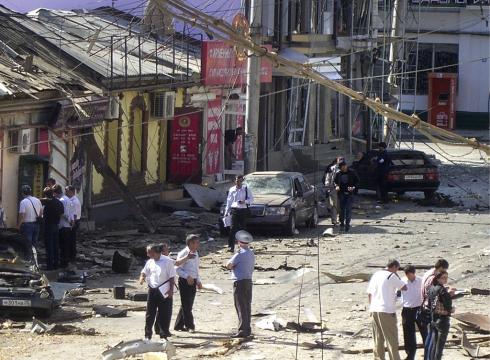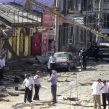
Disrespect for Human Rights Undermines Dagestan’s Security, Activists Say
Publication: Eurasia Daily Monitor Volume: 9 Issue: 165
By:

On September 6, the Memorial human rights organization unveiled an extensive overview of the human rights situation in Dagestan. At the Moscow International Book Fair, Memorial presented a book titled “The New Course of Magomedov?” which was compiled from extensive data collected by activists in Dagestan. The head of Memorial’s “Hot Spots” project, Oleg Orlov, told the Kavkazsky Uzel (Caucasian Knot) website: “When the Dagestani government headed by [Magomedsalam] Magomedov declared that the war against terrorism should be conducted within the limits of the law, we welcomed that political course, but those are [only] words. Note that in the title of the book there is a question mark, because the new course is implemented extremely unevenly, [and] the Dagestani authorities in practice have failed to break the cycle of violence in the republic” (www.kavkaz-uzel.ru, September 7).
Challenging those who propose increasing pressure on the population in response to terrorist attacks, the Memorial rights activist said that although the government cannot refrain from applying crude force when fighting terrorism, force should be used very selectively and only against the actual perpetrators of the attacks. Orlov provided several examples of numerous rights violations in Dagestan, such as kidnappings, that evidently were committed by government agents but were never even investigated. A typical example provided by Orlov occurred in 2010, when seven Salafis were detained and beaten up by police officers near the Dagestani village of Dylym. One of the detainees died as a result of maltreatment at the local police station. The rest subsequently joined the insurgency and were killed within six months. The Russian rights activists provided a set of recommendations for the government to stop the continuing cycle of violence in Dagestan. The authors of the report recommended that the authorities abide by human rights conventions unswervingly, put an end to kidnappings and torture, and prosecute unlawful actions by law enforcement personnel (www.kavkaz-uzel.ru, September 7).
While Memorial’s experts say the government is responsible for the continuing violence, other experts assert that the internal conflicts in Dagestan are so pervasive that they are extremely hard to deal with and the government has few instruments with which to make change. The journalist and expert on the North Caucasus Maksim Shevchenko called the situation in Dagestan a “tragic cleavage.” Various Dagestani criminal organizations linked to ethnic groups fight with factions in the republican government, and the government has displayed little will to counter this, according Shevchenko. To improve the security situation in the republic, Shevchenko argued, political reforms and the return of true elections are needed. “To render Dagestan peaceful, the Russian state does not need crude force and communist slogans, but concrete political actions: limit the power of the local bureaucracy, increase the status of the municipal authorities, allow Muslim parties,” the expert proposed (www.kavkaz-uzel.ru, September 9).
Maksim Shevchenko may be quite right about restoring popular participation in politics as a remedy to violence in Dagestan in the long run. The problem with this approach is that Moscow quite consciously chose to outlaw regional parties, limit political activities in the regions and restrict regions’ rights. Moscow certainly hopes to control the backlash against its policies through crude force and reframe the conflict in Dagestan as a “civil conflict” between Dagestanis. Moscow is much more comfortable with the latter scenario than with allowing people to elect their government through reasonably free and fair elections. The reasoning is simple: if elections start to function properly in Dagestan, then people in other republics and regions of Russia will demand the same kind of transparency in the political process, which will ultimately lead to the political demise of Vladimir Putin. In addition to being a threat to Putin’s rule, free and fair elections in Dagestan would alter the relationship between Moscow and Russian regions. Reforms are needed to achieve peace in Dagestan, but the Russian leadership prefers to avoid implementing reforms that would ultimately destroy its grip on power.
“The protection of citizens’ rights is such an important business that it should not be entrusted to the law enforcement agencies,” Nariman Gadzhiev, the head of government news agency RIA Dagestan told Kavkazsky Uzel. Gadzhiev stated that the republican authorities have no power over the law enforcement agencies that are under the direct control of Moscow. At the same time, he pointed out that not all claims about rights abuses turn out to be legitimate (www.kavkaz-uzel.ru, September 9). On September 6, Gadzhiev was appointed the Dagestani government’s minister for information policy and public relations (https://www.regnum.ru/news/kavkaz/dagestan/1568792.html). Gadzhiev’s cautious yet unconventional statement indicates that there are different opinions among the republican elites in regard to what is causing the violence in Dagestan to spread.
The pro-Kremlin Chechen expert Denga Khalidov pointed out one of the core issues that repeatedly sets Moscow and the North Caucasus on a collision course. “The Russian bureaucracy would like to rule the regions without taking into consideration their historical and ethno-cultural peculiarities,” Khalidov said. The expert called on the current Russian leadership to adopt the models of the Russian Empire, which applied very different sets of rules to vastly different conquered territories, ranging from Poland to the Central Asian peoples (www.kavkaz-uzel.ru, September 11). Khalidov did not explain why Russia needed to unite such different territories within its borders in the first place rather than simply giving way to national self-determination, as happened with Poland, Finland and, much later, Central Asia and other states.
The desire for a unitary political architecture may be one of the key explanations for the underlying motives of the Russian state’s actions in the North Caucasus. Russian nationalism grew since the 1960s and culminated in the demise of the Soviet Union, as the Russians did not want to share their resources in common with most of the non-Russian population of the Soviet Union and were not satisfied with being primus inter pares anymore. Having destroyed the USSR, Russian nationalism considered the Russian Federation a true home that was unquestionably Russian. However, it appeared that the new Russia was still a fairly diverse place, something that Russian nationalism has found difficult to tolerate.




